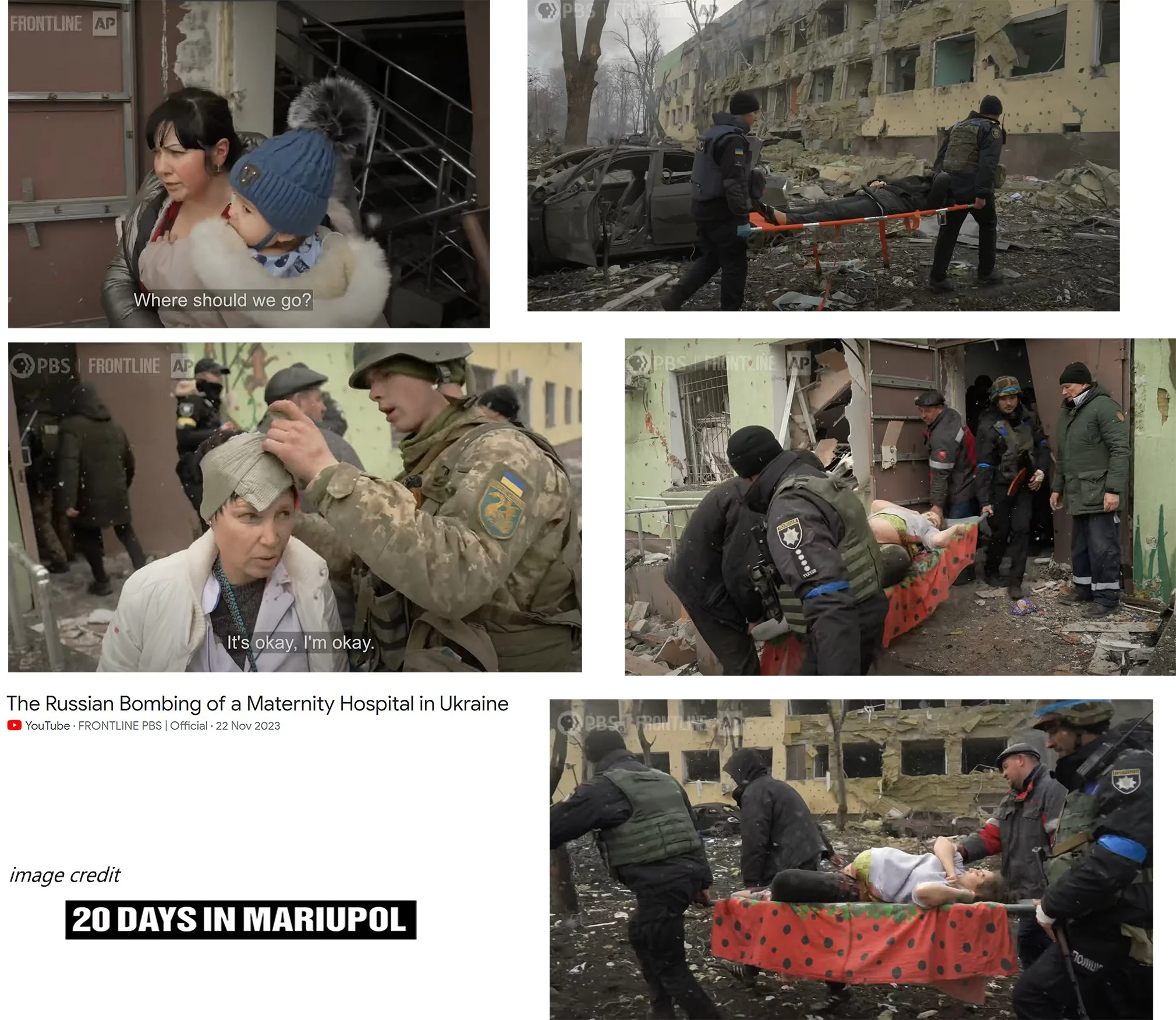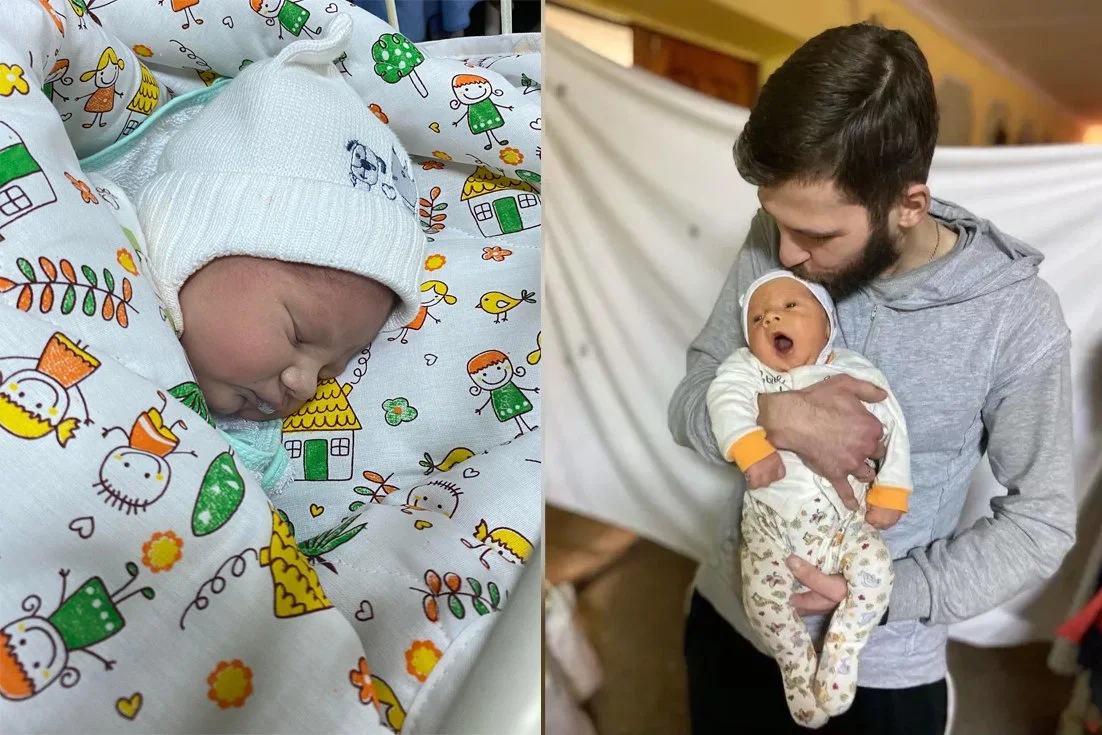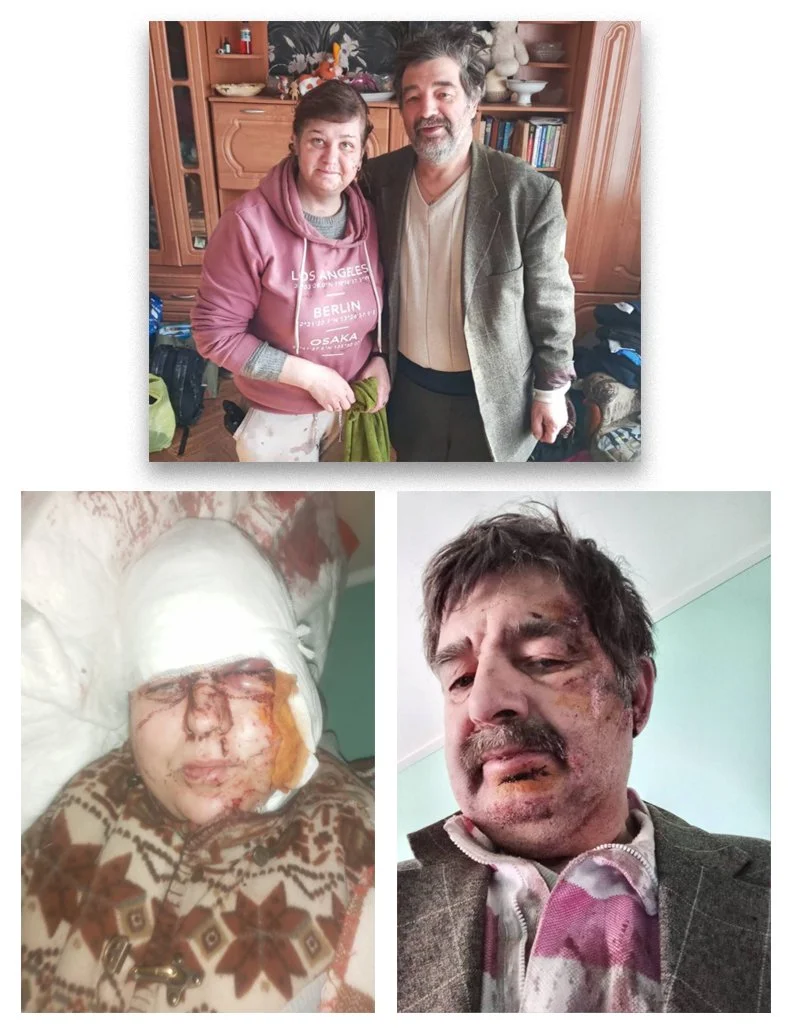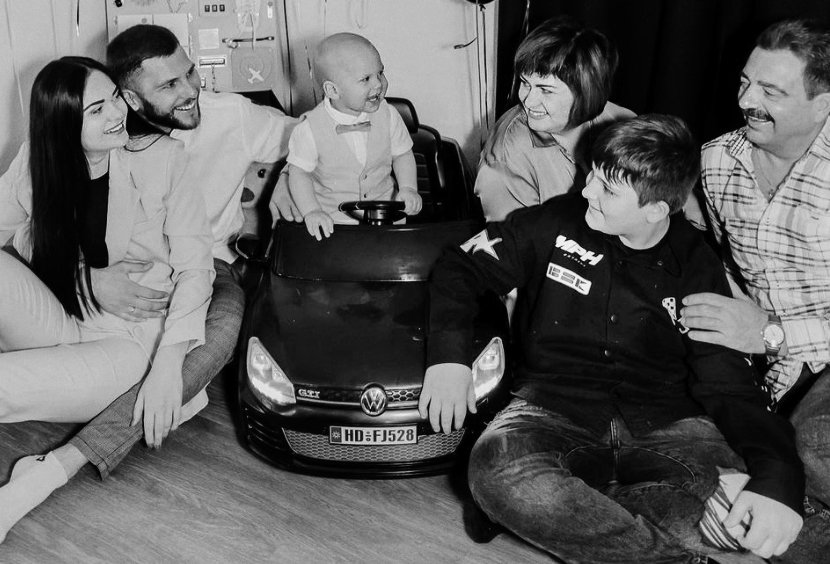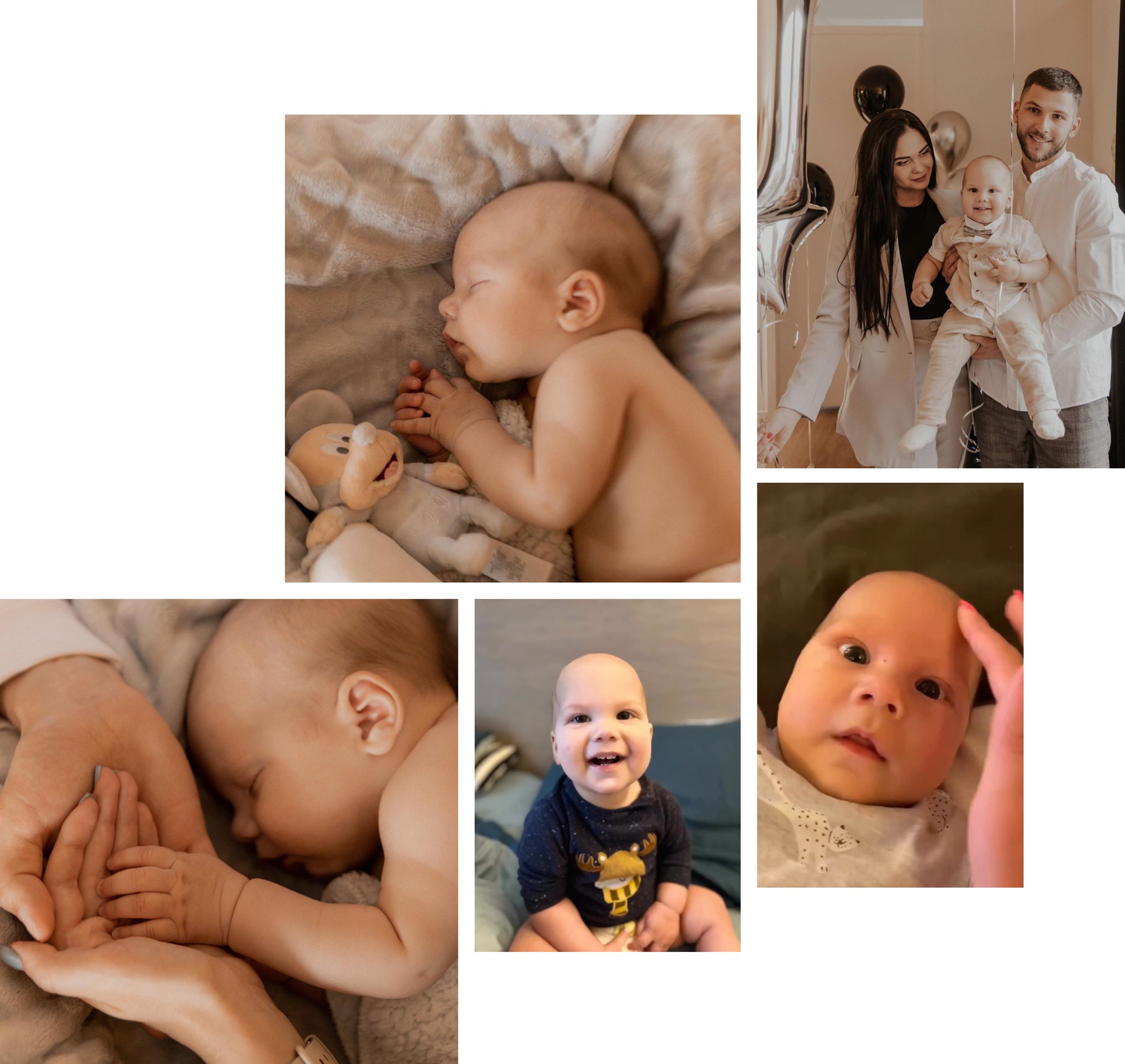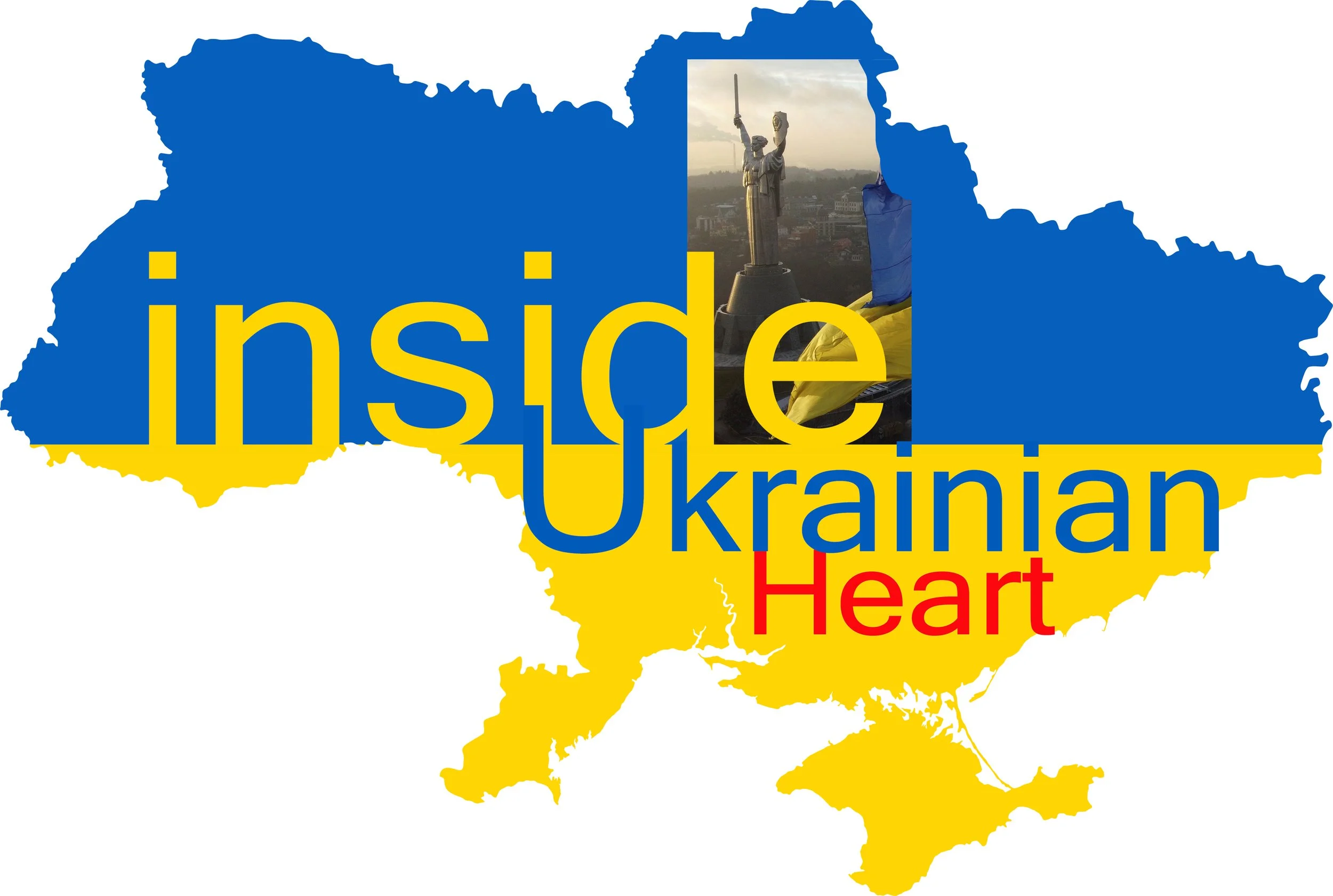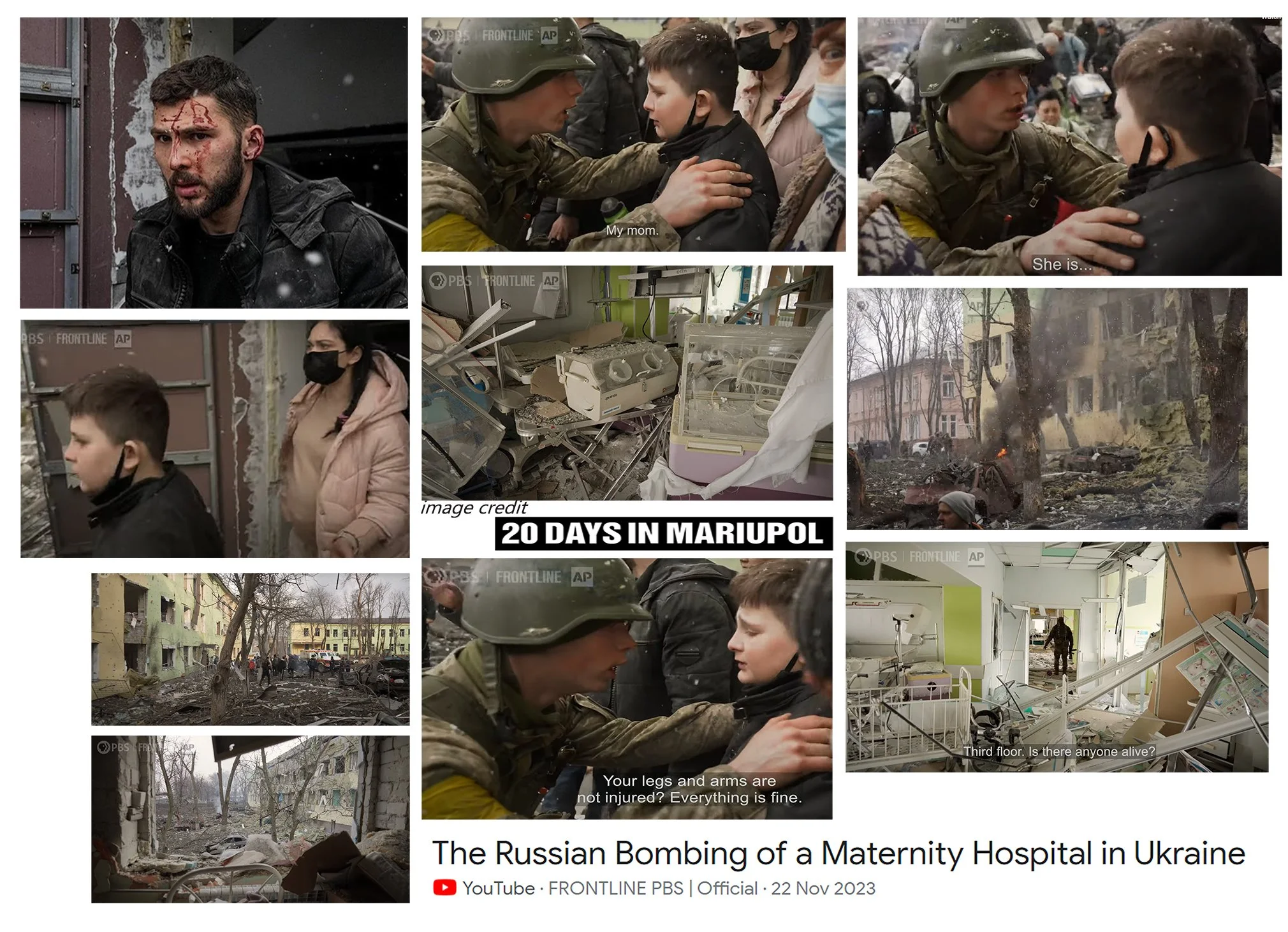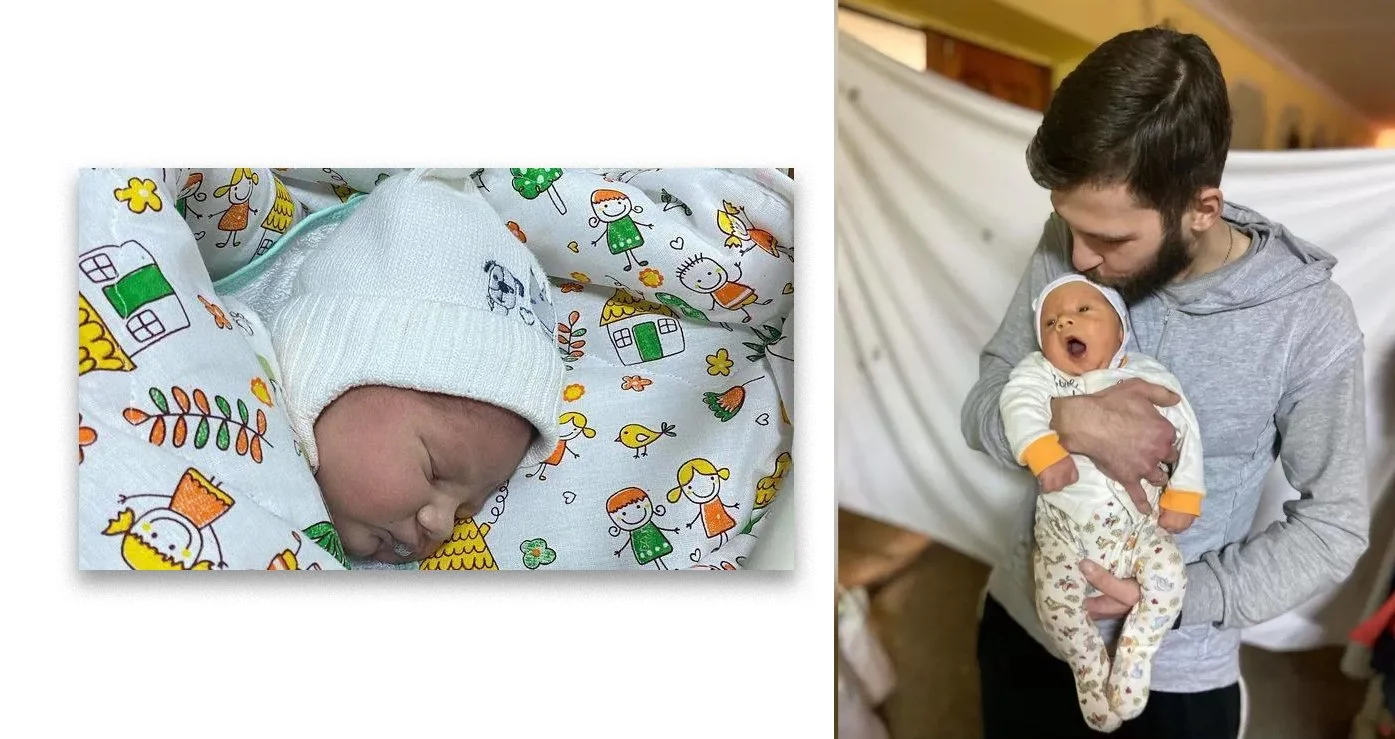THIS INSIDE UKRAINian Heart STORY IS FROM The Netherlands.
* All images and answers in the feature were provided by the WOW Woman, unless otherwise specified.
A documentary called “20 Days in Mariupol” was shot by Ukrainian journalists trapped inside south eastern Ukrainian city of Mariupol. Kharkiv-born film-maker Mstyslav Chernov and his team – photographer Evgeniy Maloletka and field producer Vasilisa Stepanenko – drove to Mariupol when everyone who could was getting out. They stayed inside the russian siege for nearly three weeks, bravely shooting and photographing events of the russian atrocities. Theirs was the only footage shot and broadcasted – bringing to the world’s attention crimes against humanity such as the bombing of the city’s Maternity Hospital No 3 on March 9., the only records from any international crew on the ground. The documentary shows very detailed atrocities carried out by the russian federation: dying children, mass graves, the bombing and deaths inside a maternity hospital - a vivid, harrowing account of civilians caught in the siege.
My WOW Woman Ms. Anastasia Piddubna and her family were such civilians inside Mariupol. From the moment of the full-scale russian invasion of Ukraine on February 24, 2022, Mariupol was being destroyed one block at a time, with people buried inside their apartments, homes and in buildings’ basements. Being on russia’s list of strategic port cities to occupy, Mariupol and its residents got no mercy. Ms. Piddubna was due to give birth in Mariupol, in March 2022. When russian bombs began to drop, she was moved to a bomb-shelter of the Maternity Hospital No. 3 in the Mariupol city center. The sequence of events in the Ukrainian filmmakers’ capture of the aftermath of the russian bombing of the Maternity Hospital No. 3 and Ms. Piddubna’s ordeal coincide in the stills above - they show Ms. Piddubna and her family members in the mere minutes after the explosion.
I have been conscious of the way I show Ukrainian women - not as pity cases or victims of war, but as steel-armoured warriors. With her stoic and brave “I’m ready to give testimony at the Hague” comment, Anastasia Piddubna confirmed my Ukrainian pride, my drive to be tougher, my resolve to keep helping Ukraine from abroad and my prerogative to keep sharing stories of Ukrainian women. I was nervous at first, contacting Anastasia. I didn’t know if my questions would retraumatize, bringing back memories of horror, but Anastasia has completely blown me away with her resolve to be a survivor made of steel. Ukrainians, especially from Mariupol, are craving a something of a unified experience, sharing of stories of trauma and recording their accounts of survival and perishment from a place they can no longer return to. The sentiment among them seems to be - don’t let the world forget us, don’t let russia erase our history, of our city and our country. It keeps me going forward in my project because I want to keep these stories alive as well.
The above shots are stills from now famous for their devastation videos, captured in a documentary 20 Days in Mariupol. The events in the documentary coincide with Anastasia’s life - the people in the images above are her family members. In the top left is Anastasia’s husband Vlad, who received a concussion as he was thrown 30 feet by an explosion wave. Luckily Vlad’s life was spared and he came to; he remained by Anastasia’s side. Below Vlad, you can see Anastasia in a pink coat, 9-months pregnant, exiting the building, looking at the aftermath of the russian attack and surely looking for her parents. Anastasia’s parents, Olga and Oleh, are not there because they weren’t so lucky - in that very moment they were being taken to another hospital with severe wounds and lacerations. The boy ahead of Anastasia is Vladik, her little brother. As he gets comforted by another, alarmingly young looking boy/soldier, he manages to cry out “I feel bad for my mom!”. Vladik will turn 11-years-old later that week and will spend his birthday in and out of bomb-shelter. Both Vlad and Vladik remain with Anastasia throughout her ordeal, occupation by russians, birth of her son and everything that follows as she describes below. Anastasia’s parents are not to be heard from, for weeks - their exit from Mariupol taking them down a completely different path.
Although the documentary is called “20 Days in Mariupol”, most residents, including Anastasia, spent much longer in the clasps of the russian terrorizers, and many are still trapped in the occupied Mariupol. Anastasia shares her story with anyone who will listen, to keep the truth alive for her countrymen, for women and mothers of Mariupol who managed to get out; she most certainly wants to scream out the truth in the memory of over 100,000 innocent people killed by the russian missiles. Thanks to Anastasia, and other brave souls like her, there will never be another illusion of just what the russian world entails. Anastasia and other women Inside Ukraine will keep sharing their experiences of Mariupol, the city of Mary, and pass it down to the next generations. A few of the brave Mariupol voices have shared their stories with WOW Woman:
Natalya Dedova, a journalist and chronicler of Ukraine war memories and a Mariupol survivor
Yuliia Mahda, artist and a Mariupol survivor
Ann Olsen, a combat medic with the Armed Forces of Ukraine, captured by the russians, Mariupol survivor
Olena Silna, a patriot and volunteer, a Mariupol survivor
Nadiya Vidvazhna, current resident of Mariupol, resistor
Interview with Ms. Anastasia Piddubna was conducted remotely. She has so far been an exception to the Inside Ukraine project, where all interviewees live on the territory of Ukraine. Ms. Piddubna’s astonishing circumstance have led her to Europe, and not by choice. Her story is so compelling that I was inspired to create an Inside Ukrainian Heart split to my coverage of Ukrainian WOW Women. Anastasia is an exceptional woman and although she resides abroad, she lives and breathes Ukraine, going to extraordinary lengths to help our nation remain in the spotlight, persevere through russian attacks and continue to seek justice on an international scale. Anastasia’s courage, willpower and her incredible nerves of steel should give us all courage to stand up against barbarism that russian federation seems to sew not only in Ukraine but all over the world.
- Olga Shmaidenko, Founder of WOW Woman
Radio Presenter, Mariupol Survivor, Ukrainian Mother
1. Your name.
My name is Anastasia Piddubna.
2. Where were you born and where do you live now?
I was born in the Ukrainian city of Mariupol, but now, because of the full-scale war, I don't have a home or even a city to return to. Mariupol, aka as the City of Mary, has changed into an occupied hell. Because of this, I am forced to stay away from my home.
3. What did you study and what is your profession? What did your typical day look like before the war and how has your role changed since the invasion of Ukraine?
Before the full-scale war, I worked as a live radio presenter and was happy because it was my dream since childhood. I used to drink my morning coffee, drive to the radio station with enthusiasm and start my day with greetings to the best audience - the residents of Mariupol. After work, I always had visits with my family or friends. Every day was full. And now, russia has taken away my happy day-to-day life, my dreams, my home, and all the plans I made for my plans.
4. What motivates you at the moment?
Now, the only thing that motivates me to keep going is my son! He was born in a basement during a full-scale war. Now he is one year and eight months old. So, I have to be strong so that my child grows up with a happy life, as much as it is possible now.
5. What do you consider to be your strengths or even superpowers?
I believe that my strongest point is that I am Ukrainian! This is already a superpower! Because russia can take away everything from us, except for the thirst for life, and justice; russians will never break the Ukrainian indestructibility!
6. What concrete actions (big or small) have you taken and continue to take to help Ukraine and the Ukrainian people?
I continue talking about the crimes committed by the russian federation, and I am ready to testify at the Hague. I give a lot of interviews. Donations have become commonplace. I also volunteer and collect humanitarian aid, which I send to Ukraine. At my own expense, together with my family, we provide military families and families who have lost everything but are in Ukraine with all the necessary things and clothes. For now, my vote is that the war continues! For those in the country and for those abroad. We have no right to be silent!
7. How do you take care of yourself, physically and mentally? Is it realistic to remain morally stable in a time of war? What exactly helps you to remain sane?
I have been undergoing psychological counselling. But we will never be the same as we were before the full-scale war! These wounds are incurable, unfortunately... But I will never give up and will continue to believe in the Ukraine's future!
8. Do you feel that the war has changed you? How exactly? Were you surprised about yourself, people and the world in general? Can you describe something as an epiphany?
Of course, I have a feeling that the war changed me. I became more sensitive. I cry more often. But at the same time, I harbour a feeling of hatred towards everyone who supports the actions of the russian federation. It kills me emotionally. I will never be able to find excuses for such people, if you can call them that.
9. At what point did you feel that the war had come to Mariupol? What happened, where were you and how did you survive the bombing and shelling?
For the first time, the war came to us in 2014. It was very noticeable, because since then, our people have been dying. Both military and civilians. For 10 years now, we have been witnessing crimes committed by the russian federation. But since February 24, 2022, our lives have not only changed, they seem to have stopped. I was eight months pregnant. We gathered as a family in my parents' house. From the second of March 2022, we were left without gas, electricity, working shops, pharmacies, etc. We constantly heard explosions and shelling. There were no sirens, no OSCE, no evacuations. Food and water supplies were running out. Because of the constant stress and nervousness, on March 5th, we decided to go with the whole family to a safer location - to the maternity hospital No. 3, which was in the centre of the city. We stayed there, in the bomb shelter until March 9th. It was on that day that russia launched an air bomb.
People died, children died. A large number of pregnant women, children and civilians were wounded and many died. During the air strike, my whole family was helping to feed hospital patients by volunteering in the outdoor field kitchen - this had to be done over the wood-burning stoves because there was of course no electricity at this point.
My family heard the sounds of the russian aircraft overhead and started running to the bomb shelter, where I was with my younger brother. But they didn't make it in time - my parents were seriously injured and were immediately transferred to another hospital. I didn't know what was going to happen to them.
Meanwhile my husband, brother and I were taken to the other side of the city to a maternity hospital. From then on, we did not know if my parents survived and what happened to them.
On March 18, 2022, my brother turned 11 years old. It was his first birthday without parents, gifts and happy events. Every day, I wrote a letter to my mother, hoping that the Red Cross or volunteers would come to us and be able to pass the letter to them. I believed they were alive. I knew that if they had survived, then 100% by their son's birthday, they would definitely find us. But when they did not appear, I realised that I had to somehow find a way to live differently, without them. At the time, I lied to my brother and told him that I had managed to get through to my mother, she sends her love and wishes to be there, but she cannot make it because of the constant shelling; when it's quieter, they will surely come right away. After I delivered that lie, I would have to walk away and cry because my heart was torn to pieces.
An ambulance arrived and offered to evacuate me to the left bank (Mariupol is divided by the Kalmius River. In the first half of March, the left bank was still under Ukrainian control, and there was less shelling there than in the area of the Maternity Hospital No 3, which was in the city center). I said that I would not go anywhere without my husband and brother. Fortunately, we were accepted as a group. I was travelling in an ambulance, and my husband was following us in his car. His glasses flew off after the air strike. Without them, he can see maybe at about 10%, he can't see a person's face at arm's length. In addition, he had a severe concussion, was nauseated, and had a persistent headache. I don't know how he got there, he doesn't know himself. He simply had no choice.
On March 21, 2022, I went into labour. It coincided with the beginning of the "cleansing" of the nearby neighbourhood. This was the tactic russians were adopting - they chose a Mariupol city square and proceeded to "erase" it. Russians began around 3 or 5AM, my contractions started at 5:30AM; at first I thought my stomach was cramping with anxiety. Giving birth was difficult, there were beds next to each other with two women who had also been brought in from the bombed-out maternity ward. One gave birth, the other did not; she was 38 and after many heroic attempts by the doctors, it was an unsuccessful delivery, her first pregnancy. After yet another airstrike, the woman was evacuated, and the baby was taken out of her womb dead. Psychologically, it was hard for me to give birth next to that woman, because although she was alive, she didn't live anymore. It went on like that for 24 hours, as I was giving birth, everything was rumbling around me. I would normally have an emergency caesarean. They injected all sorts of drugs, but there was no light or water in the hospital - physically I couldn't have a safe caesarean; I was left giving birth on my own.
Russians kept clearing whole neighbourhoods nearby for the next two days we were under constant shelling. I am 25 years old, and for 25 years I’ve heard the phrase that when a child is born, the first seconds are such pure happiness. Unfortunately, I didn't get to experience it. You hear this shooting and you just want to get up from the operating table and quickly get away from the shelling, and there is nowhere to go. At one point, the doctor told me "We are losing the baby, nothing is working", and I became frantic with panic. But finally, at 2:25 a.m. on March 22, 2022, Damir was born. The doctors said it was just a gift from God.
On March 22, 2022, my son was born under doctors' flashlights, in the cold, without medicine or water, and in unsanitary conditions. The contractions began on March 21, at about 6 AM. But due to stress, hunger and fatigue, my son was born only on March 22, at 2:25 AM.
I experienced mixed emotions of joy and bewilderment as to how one can protect their child while being in such extreme danger. All I could think of was: "Why? (is this being done to us, Ukrainian civilians)?" and "For what reason? (is this being done to us)?" I felt a great guilt towards this child, a little person who hasn't done anything yet, and they already want to kill him. All this time has passed, and I cry every time I remember. I will never be able to forgive them for this.
In early April 2022, russian soldiers arrived at the maternity hospital. Unceremoniously, dirty and smelling of alcohol and cigarettes, they sat on the beds next to the pregnant women and new mothers, and talked to us. Along with the military, the press started entering the basement with cameras already turned on. "Why don't you want to go to Russia? Or maybe to Donetsk? How did you feel when you gave birth?", they stupidly asked us. It felt like they were carrying out a continual psychological attack on us. Kadyrov's men (Kadyrov is a leader of Russia's Chechnya region) came and said they would "give our children assault rifles" and they would "live happily in russia and defend it". At that time, the occupants from the russian federation had already settled in our maternity hospital, as if they were at home, and said that we were now on the territory of the russian federation.
10. How did you leave Mariupol, how were you able to get out with your little boy and where did you go?
We stayed under russian occupation until April 10, 2022. Unfortunately, the maternity hospital was located on the left bank of the city, and under full russian control at this point. The only way to get out was to go towards and through russia; so we had to go through the monstrous "filtration camps" they erected. Other roads towards Ukraine were already closed. So the three of us, my husband, myself and our newborn son, set off. As we passed through their humiliating and barbaric filtration, my husband was threatened and humiliated. Then, after a few hours of this, he was let go. Then we reached actual russian border, they did not let us enter because my son did not have a birth certificate. They forced us to make one on the territory of russia, but we refused to put such an evil label on him. Then, because of all the stress, I lost my milk. Staying on the territory of the aggressor country was hell for me, and in a determined way, we kept pushing and found a way out, through the Russian-Belarus border.
There, we finally got news about my parents' fate - they were alive and were able to get out to Cherkasy (Ukrainian territory) - there, they were able to make my son a Ukrainian birth certificate. Once we crossed the border into Europe, we felt relieved. In May, we finally reunited with my mother! She underwent rehabilitation and treatment in Ukraine and came to us. Later, my dad came too, as a Group 3 disabled person. Mum had the left side of her face stitched up. My parents received numerous injuries and concussion. But we thank fate that they are alive and safe now!
A family made of steel. Anastasia’s parents are survivors, perseverers and heroes. In the left image, Olga, Anastasia’s mother, and Vlad, Anastasia’s husband, are shown preparing food for the patients of the maternity hospital (including the 9-months pregnant Anastasia). Since russians cut the power and water supply, field kitchens like this were set up all over the city. Seconds after this photo was taken, Olga, Anastasias’ father Oleh and Vlad were hit by the shaprnel from a devastating russian bomb. Russia’s war crime, documented through their barbaric hit of the maternity clinic No.3. Both Olga and Oleh were gravely injured, as seen in photo on the right.
In his incredible accounts of the events, Oleh writes: “I was just 10 meters from the entrance to the basement when I heard the sound of an airplane. I shouted, “Plane!’ And we ran to the shelter. Suddenly there was an incredible explosion, crashing! Olga hit her head on the wall, glass and bricks fell onto her. I was in a puffer coat. I fell onto her, covered her legs and started shouting “Olga! Olga!”
As survivors and Ukrainian super humans, Anastasia’s parents survived, wrote about their experience and continue giving interviews to any news outlet that will listen about the russian atrocities in Mariupol. Olga and Oleh are doing it for those who no longer have a voice.
11. What do you know about the inside of Mariupol now? Do you have any relatives, friends or acquaintances there? Do you think Ukrainians who are currently in Mariupol resist the occupier? Do you feel that the majority of residents want to return to Ukrainian rule?
I have a few friends left in Mariupol, but I don't keep in touch with them.
It's hard for me to say which side the people in Mariupol, who remained, are on. Some people believe in the “russkiy mir” (russian peace), and some have specific reasons for remaining there. Whatever it may be, individuals who support the deaths of children, people, abuse, and genocide are not Ukrainians (never were, never will be).
12. In your opinion, how do russians differ from Ukrainians? Do you want justice for russians? Do you think it is possible and what would you like to see happen?
You’re taking an invalid approach, when trying to compare Ukrainian people to the russian people, because we have different worlds that surround us and we inhabit. We will never be "brotherly neighbours". This is because Ukrainians are unbreakable, strong, and most importantly free people. Unlike russian murderers who live without a right to their own opinion, are not able to carry out own critical thinking nor understand true personal nor national freedoms. They are punished by the sheer fact that they are russian. I want this country to be isolated from the rest of the world, because while they continue to enjoy life, others (Ukrainians) are dying! I don't wish death on them nor their children, but I do wish justice, fairness, and accountability! I hope no other country will forgive russia's acts of murder and genocide that are still, to this day, continuously committed against the Ukrainian people!
13. What would you like the world to know about Ukrainians from Mariupol? And, in particular, about Ukrainian women?
I want the world to witness how Ukraine is fighting for its freedom! People from Mariupol are made of steel. They believe in victory and are doing absolutely everything for the freedom of their country!
Ukrainian women in particular, have never been broken. They are protecting their children and fighting for their free nation! Mariupolites are people with eternal emotional wounds, yet they have big hearts coloured in two stripes: blue and yellow!
14. What place or activity gives you the most pleasure now, if any?
Now, my greatest pleasure is the memories I have in a peaceful country, in Mariupol, at peace time. However, they are quickly clouded by the memories of the war; as such, life today cannot be called a happy one. Even the sea does not calm me down, because it is not my own sea of Azov. But I know one thing for sure, my faith in returning to my hometown someday, is a small piece of joy and hope I carry with me everywhere.
Images source here. Mariupol then and now.
15. What will be the first thing you do when Ukraine wins? What do you dream of for yourself and your family after the war is over?
The first thing I will do will be to show my son his homeland. This is my dream today. Because my son is a Ukrainian, and I want him to grow up in a free country, to adopt the Ukrainian spirit and to learn Taras Shevchenko's poetry at school. I am confident that victory will be ours! Glory to Ukraine's Armed Forces, Glory to Ukraine!
16. Where can others find information about you/your activities? (links to website, social media pages, etc.)
Instagram: @anast_asia_x
* Всі фотографії та відповіді в матеріалі були надані WOW Woman, якщо вказано інакше.
Документальна робота під назвою "20 днів у Маріуполі" була знята українськими журналістами, які опинилися в місті Маріуполь на південному сході України. Харківський режисер Мстислав Чернов та його команда - фотограф Євген Малолєтка та оператор Василіса Степаненко - приїхали до Маріуполя, коли всі, хто міг, покидали його. Вони залишалися в російській блокаді майже три тижні, мужньо знімаючи та фотографуючи події російських звірств. Їхні кадри були єдиними знятими і переданими в ефір, привертаючи увагу світової спільноти до таких злочинів проти людяності, як бомбардування міського пологового будинку №3 9-ого березня, єдиними записами, зробленими міжнародною командою на місці подій. У фільмі дуже детально показані звірства, скоєні російською федерацією: вмираючі діти, масові поховання, бомбардування і смерті в пологовому будинку - яскрава, жахлива розповідь про мирних жителів, які опинилися в облозі.
Моя WOW-жінка Анастасія Піддубна та її сім'я були такими цивільними особами в Маріуполі. З моменту повномасштабного російського вторгнення в Україну 24 лютого 2022 року Маріуполь руйнувався квартал за кварталом, а люди були поховані у своїх квартирах, будинках та підвалах будівель. Маріуполь та його мешканці не знали пощади, оскільки місто було включене до російського списку стратегічних портових міст, які планувалося окупувати. Пані Піддубна мала народити в Маріуполі в березні 2022 року. Коли почали падати російські бомби, її перевезли до бомбосховища пологового будинку № 3 у центрі Маріуполя. Послідовність подій у фільмі українських режисерів про наслідки російського бомбардування пологового будинку № 3 та випробування пані Піддубної збігаються на наведених вище кадрах - на них зображені члени сім'ї пані Піддубної в перші хвилини після вибуху.
Я дуже свідомо показую українських жінок - не як об'єктів жалю чи жертв війни, а як воїнів у сталевих обладунках. Своїм стоїчним і хоробрим коментарем "Я готова дати свідчення в Гаазі" Анастасія Піддубна підтвердила мою українську гордість, моє прагнення бути сильнішою, мою рішучість продовжувати допомагати Україні з-за кордону і мою прерогативу продовжувати ділитися скарбами українських жінок. Спочатку я хвилювалася, коли зв'язувалася з Анастасією. Я не знала, чи не травмуватимуть мої запитання, чи не викличуть спогади про жах, але Анастасія повністю вразила мене своєю рішучістю бути виживальницею, зробленою зі сталі. Українці, особливо з Маріуполя, прагнуть чогось спільного, ділитися історіями травм і записувати свої розповіді про виживання і загибель з місця, куди вони більше не можуть повернутися. Серед них панує таке відчуття: не дозвольте світові забути нас, не дозвольте росії стерти нашу історію, нашого міста і нашої країни. Це спонукає мене рухатися вперед у моєму проекті, тому що я також хочу зберегти ці історії живими.
Наведені вище кадри - це кадри з відомого тепер відео руйнувань, знятого в документальному фільмі "20 Днів у Маріуполі". Події у фільмі збігаються з життям Анастасії - люди на фотографіях є членами її сім'ї. У верхньому лівому кутку - чоловік Анастасії Влад, який отримав контузію, коли його відкинуло вибуховою хвилею на 30 футів. На щастя, життя Влада не постраждало, і він прийшов до тями; він залишився поруч з Анастасією. Під Владом ви можете побачити Анастасію в рожевому пальто, на 9-му місяці вагітності, вона виходить з будівлі, дивлячись на наслідки російської атаки і, безсумнівно, шукаючи своїх батьків. Батьків Анастасії, Ольги та Олега, там немає, бо їм не пощастило - в той самий момент їх везли в іншу лікарню з важкими пораненнями та рваними ранами. Хлопчик попереду Анастасії - Владик, її молодший брат. Коли його заспокоює інший, дуже юний на вигляд хлопчик-солдат, він встигає вигукнути: "Мені шкода маму!". Наступного тижня Владику виповниться 11 років, і він проведе свій день народження в бомбосховищі і поза ним. Владик, і Влад залишаються з Анастасією протягом усього її випробування, окупації росіянами, народження сина і всього, що відбувається далі, як вона описує нижче. Про батьків Анастасії не було чути тижнями - вони виїхали з Маріуполя і пішли зовсім іншою дорогою.
Хоча документальний фільм називається "20 Днів у Маріуполі", більшість мешканців міста, в тому числі й Анастасія, провели в лещатах російських терористів набагато більше часу, і багато хто досі перебуває в пастці в окупованому Маріуполі. Анастасія ділиться своєю історією з усіма, хто буде слухати, щоб зберегти правду для своїх земляків, для жінок і матерів Маріуполя, яким вдалося вибратися звідти; вона, безумовно, хоче докричатися до правди в пам'ять про понад 100 000 невинних людей, убитих російськими ракетами. Завдяки Анастасії та іншим сміливцям, подібним до неї, більше ніколи не буде ілюзій щодо того, що таке "русский мир". Анастасія та інші жінки з "Inside Ukraine" продовжуватимуть ділитися своїм досвідом Маріуполя, міста Марії, і передаватимуть його наступним поколінням. Кілька сміливих маріупольських жінок поділилися своїми історіями з WOW Woman:
Наталя Дєдова, журналістка та хронікерка воєнної пам'яті України, яка пережила Маріуполь
Юлія Магда, художниця, яка пережила Маріуполь
Анна Ольсен, бойовий медик Збройних Сил України, яка потрапила в полон до росіян, пережила Маріуполь
Олена Сильна, патріотка та волонтерка, маріупольчанка, яка пережила блокаду
Надія Відважна, нинішня мешканка Маріуполя, активістка
Інтерв'ю з Анастасією Піддубною було проведено дистанційно. Досі вона була винятком у моєму проекті "Всередині України", де всі, у кого я брала інтерв'ю, живуть на території України. Дивовижні обставини привели пані Піддубну до Європи, і не за власним бажанням. Її історія настільки переконлива, що мене надихнула на створення рубрики "Зсередини Українського Серця" до мого матеріалу про українських WOW-жінок. Анастасія - виняткова жінка, і хоча вона проживає за кордоном, вона живе і дихає Україною, докладаючи надзвичайних зусиль, щоб допомогти нашій країні залишатися в центрі уваги, вистояти під час російських атак і продовжувати шукати справедливості на міжнародному рівні. Сміливість, сила волі Анастасії та її абсолютно сталеві нерви повинні надати нам усім мужності протистояти варварству, яке російська федерація, здається, шиє не лише в Україні, але й в усьому світі.
- Ольга Шмайденко, засновниця WOW Woman.
РАДІОВЕДУЧА, МАРІУПОЛЬСЬКА ПЕРЕЖИВИЦЯ, УКРАЇНКА, МАТИ
1. Ваше Ім'я
Моє ім’я Анастасія Піддубна.
2. Де ви народилися і де живете зараз?
Я народилася у місті Маріуполі, але зараз, через повномасштабну війну, в мене немає дому та навіть міста. Місто Марії змінилося на окупацію. Через це, я вимушена перебувати за кордоном.
3. На кого вчилися і яка у вас професія. Який вигляд мав ваш звичайний день до війни і як змінилася ваша роль після вторгнення в Україну?
До повномасштабної війни, я працювала радіоведучою прямих ефірів і була щаслива, бо це була моя мрія з дитинства. Я випивала ранкову каву, з натхненням їхала на радіостанцію і починала свій день з привітань до найкращої аудиторії — людей Маріуполя. А після роботи, я завжди мала зустрічі з родиною, або друзями. Кожен день, був насичений. А тепер, росія відібрала щасливу буденність, мрії, будинок, і всі плани на майбутнє.
4. Що вас мотивує на даний момент?
Та зараз, єдине що мене мотивує жити далі, це мій син! Який народився у підвалі, під час повномасштабної війни. Зараз, йому рік і 8 місяців. Тому я маю бути сильною, щоб моя дитина зростала щасливим життям, на скільки це зараз можливо.
5. Що ви вважаєте своїми сильними сторонами чи навіть надздібностями?
Я вважаю, що моя найсильніша сторона - це те, що я є Українкою! Це вже є надздібносттю! Бо росія може забрати у нас все, окрім жаги до життя, справедливості і ніколи не зламає українську незламність!
6. Які конкретні дії (великі чи маленькі) ви зробили і продовжуєте робити, щоб допомогти Україні та українському народу?
На разі, я даю свідчення про злочини з боку рф, і готова надавати їх у Гаагському суді. Даю безліч інтерв’ю. Донати - стали буденністю. Також, я є волонтер і збираю гуманітарну допомогу, яку відправляю в Україну. За власний рахунок, разом зі своєю родиною, забезпечуємо сім’ї військових і сім’ї, які все втратили, але перебувають в Україні всіма необхідними речами і одягом. На разі, мій голос про те, що війна триває! Для тих хто на території держави, і для тих, хто за кордоном. Ми не маємо права на мовчання!
7. Як ви дбаєте про себе? Чи реально залишатися морально стабільним в умовах війни? Що саме допомагає залишатися собою?
Я проходила реалібітацію з психологом. Але вже ніколи, ми не будемо такими, якими були до повномасштабної війни! Ці рани не виліковні, на жаль… Але я ніколи не складаю руки і вірю в українське майбутнє!
8. Чи є відчуття, що війна змінила вас? Як саме? Чи здивувалися про себе, про людей і світ загалом? Чи можна щось назвати вашим прозрінням?
Звичайно, є відчуття, що війна змінила мене. Я стала більш чутлива. Я стала більше плакати. Але разом з цим, я поєдную відчуття ненависті до всіх, хто підтримує дії рф. Це вбиває емоційно. Я ніколи не зможу знайти виправдань таким людям, якщо їх можна так назвати.
9. У який момент ви відчули, що війна прийшла до Маріуполя? Що сталося, де ви були і як пережили бомбардування та обстріли?
Вперше, війна прийшла до нас у 2014 році. Це було відчутно, бо вже відтоді, вмирали наші люди. Військові, і цивільні. Вже 10 років, ми є свідками злочинів з боку рф. Але з 24 лютого 2022 року, наше життя не просто змінилося, а ніби зупинилося. Я була на 8 місяці вагітності. Ми зібралися родинним колом в будинку моїх батьків. З другого березня залишилися без газу, світла, працюючих магазинів, аптек, і тощо. Постійно чули вибухи та обстріли. Не було сирен, ОБСЄ та евакуацій. Закінчувалися запаси їжі і води. Через постійний стрес та нервування, 5 березня, було вирішено їхати всією родиною до більш безпечного міста - до пологового будинку номер 3, який був у центрі міста. Там, у бомбосховищі ми прожили до 9 березня. Бо саме в цей день, росія випустила авіабомбу. Загинули люди, загинули діти. Велика кількість поранених вагітних жінок, дітей і цивільних людей. Під час авіаудару, вся моя родина перебувала на польовій кухні, бо вони прийняли пост годувати всіх, хто перебуває у лікарні. Вони почули звук літака і побігли в бомбосховище, де у той час перебувала я разом з молодшим братом (10 років). Але не встигли. Важкопоранених батьків одразу перевезли в іншу лікарню. А мене, чоловіка і молодшого брата, на інший бік міста у пологовий будинок. Відтоді, ми не знали , чи вижили батьки і що з ними.
18 березня 2022 року моєму братову виповнилося 11 років. Це був перший день народження без батьків, подарунків і щасливих подій. Кожного дня, я писала лист до мами, з надією, що приїде до нас червоний хрест, або волонтери і зможуть передати їм листа. Я вірила, що вони живі. Я знала, що якщо вони врятувалися, то 100% до дня народження їхнього сина, вони обовязково знайдуть нас. Але коли вони не прийшли, я зрозуміла, що треба якось вчитися жити інакше, без них. Я брехала братові, що вдалося додзвонитися мамі, і вона переказує вітання, але не може бути поруч через постійні обстріли. Коли буде тихіше, вони одразу прийдуть до нас. Після цього, відходила і плакала, бо серце рвалося на шматки.
Приїхала скора допомога і запрополагала мені евакуацію на лівий берег (Маріуполь розділений на дві частини річкою Кальміус. У першій половині березня лівий берег ще перебував під контролем України, і там було менше обстрілів, ніж у районі 3-ї міської лікарні). Я сказала, що без чоловіка і без брата я нікуди не поїду. Але, благо нас прийняли в такому складі. Я їхала на швидкій, а чоловік - на машині своїй за нами. Окуляри в нього після авіаудару злетіли. Він без окулярів, можливо, відсотків десять бачить, на відстані витягнутої руки не бачить навіть обличчя людини. У нього ще був струс мозку сильний, нудило, постійно боліла голова. Я не знаю, як він доїхав, він сам не знає. У нього просто не було вибору.
21 березня у мене почалися пологи. Це збіглося з початком "зачистки" району. Це була тактика росіян - вони вибирали якусь площу в місті і "зачищали" її. Почалося це десь о 3-5 годині ранку, потім у мене почалися перейми о 6 ранку, я думала, що від хвилювання. Народжувати було важко, поруч стояли ліжка з двома жінками, яких також привезли з розбомбленого пологового відділення. Одна народила, інша - ні; їй було 38 років, і після багатьох спроб це були невдалі пологи, це була її перша вагітність. Після авіаудару, коли жінку евакуювали, дитину витягли з її утроби вже мертвою. Психологічно мені було важко народжувати поруч з цією жінкою, вона була жива, але вже не жила. Так тривало 24 години, я народжувала, а навколо мене все гуркотіло. Мені б зазвичай робили екстрений кесарів розтин. Вони вводили всілякі уколи, але в лікарні не було ні світла, ні води - фізично я не могла зробити безпечний кесарів розтин, тому народжувала сама.
Наступні два дні, росіяни зачищали цілі квартали поблизу, і ми були під постійними обстрілами. Мені 25 років, і 25 років я чую фразу: "коли народжується дитина, то перші секунди - це таке чисте щастя". На жаль, мені не довелося цього пережити. Ти чуєш цю стрілянину, ти хочеш просто встати з операційного столу і швидко втекти кудись подалі від обстрілів. А йти нікуди.
У якийсь момент лікар сказав мені: "Ми втрачаємо дитину, нічого не допомагає", і мене охопила паніка. Але о 2:25 ночі 22 березня Дамір народився.
22 березня 2022 року, під ліхтариками, в холоді, без медикаментів та води і в антисанітарії народився мій син. Перейми почалися ще 21 березня, близько 6 години ранку. Але через стрес, голод та втому, мій син з’явився на світ аж 22 березня в 2:25.
Це були змішані емоції радості і нерозуміння, як захистити свою дитину, коли ти сама в небезпеці. В голові були лише питання «Чому?» та «За що?». Була велика провина перед дитиною. Людина не встигла зробити ще нічого, а її вже хочуть вбити. Пройшло півтора року, а я кожен раз, як пригадую, плачу. Я ніколи не зможу пробачити.
На початку квітня у пологовий приїхали російські військові. Безцеремонно, "брудні і з перегаром" вони сідали на ліжечках до вагітних і говорили з нами. Разом із військовими у підвал уже з включеними камерами забігала преса. "Чому не хочете їхати в Росію? А може в Донецьк? А що ви відчували, коли народжували?” Це була якась психологічна атака. Приходили кадировці і казали , що видадуть нашим дітям автомати і вони будуть щасливо жити в росіі і захищати її. В нашому пологовому на той час, вже розташувалися окупанти, як у себе вдома і казали, що ми на території рф.
10. Якого дня ви виїхали з Маріуполя і як вам вдалося вибратися звідти і куди попрямували?
Так в окупації ми перебували до 10 квітня 2022 року. На жаль, пологовий будинок знаходився на лівому березі міста. І єдиний шлях вибратися - це лише у бік росіі, через фільтрацію. Бо інші дороги у бік України були вже перебиті. Так втрьох ми і вирушили. На фільтрації, мій чоловік зазнав погрози і приниження. Але через декілька годин відпустили. Коли ми були на кордоні росіі, нас не випустили, бо мій син не має свідотства про народження. Вони змушували робити його на території росіі, але ми відмовилися ставити йому таке тавро. Тоді, через цей стрес я втратила молоко. Бо залишитися на території країни агресора для мене було пекло. Але ми знайшли вихід, і виїхали через русько-білоруський кордон. Там, ми зв’язалися з батьками, дізналися що вони живі і де перебувають. І вони вирушили до Черкас, де зробили моєму синові українське свідотство про народження. Перетинув кордон Європи, нам значно стало легше. Та вже у травні, ми зустрілися з мамою! Вона пройшла реалібітацію та лікування в Україні і приїхала до нас. А згодом, і тато, як інвалід 3 групи. Мамі зашивали ліву сторону обличчя. Батьки отримали безліч травм і контузію. Але дякуємо долі, що живі і зараз у безпеці!
11. Що ви знаєте про внутрішній світ Маріуполя зараз? Чи залишилися у вас там родичі, друзі, знайомі? 13. Чи чинять українці, які зараз перебувають у Маріуполі, опір окупанту? Чи відчуваєте ви, що більшість мешканців хочуть повернутися під владу України?
В Маріуполі залишилося декілька знайомих, зв’язок з якими я не підтримую.
Мені важко сказати, на якому боці люди в Маріуполі, які залишися. Бо хтось вірить у руський мир, а хтось має певні причини там залишатися. Але ті, хто підтримує смерті дітей, людей, знущання та геноцид - не є українцями.
12. Чим, на вашу думку, росіяни відрізняються від українців? Чи бажаєте ви правосуддя для росіян? Чи вважаєте ви, що це можливо і що б ви хотіли, щоб сталося?
Порівнювати український народ з російським взагалі не є нормою. Бо в нас різні світи. Ми ніколи не будемо країнами - братами. Бо українці - незламний, сильний, а головне вільний народ. Навідміну від вбивць, нації яка не має право на власну думку, мислення і розуміння про свободу. Вони покарані вже тим, що є росіянами. Я хочу, щоб ця країна була в ізоляції від всього світу. Бо поки вони продовжують насолоду від життя - вмирають інші люди! Я не бажаю смерті їм або їх дітям, але я бажаю правосуддя та справедливості! Щоб жодна країна світу, не пробачила росіі вбивства і геноцид, які зараз вони несуть українському народу!
13. Що б ви хотіли, щоб світ дізнався про українців з Маріуполя на даний момент? І, зокрема, про українських жінок?
Я хочу, щоб світ бачив, як Україна виборює свою свободу! Люди з Маріуполя - це люди зі сталі. Які сьогодні вірять в перемогу і роблять все, заради свободи своєї держави! Зокрема, і українські жінки, які в жодному разі не зламалися, захищають своїх дітей, борються за вільну країну! Маріупольці - це люди з вічними душевними ранами, але дуже великим серцем, в якому є два кольори: блакитний і жовтий!
14. Яке місце чи діяльність приносить вам найбільше задоволення зараз, якщо це можливо?
Зараз, моє місце задоволення - це спогади, які залишилися в мирній країні, в мирному Маріуполі. Але попри все, їх швидко затуманюють спогади про війну… Життя сьогодні, не можна назвати щасливим. Навіть море не заспоковує, бо вони не рідне. Але я точно знаю, що віра в повернення до рідного міста, то є маленька насолода і надія.
15. Що ви зробите в першу чергу, коли Україна переможе? Про що ви мрієте для себе і своєї сім'ї після закінчення війни?
Бо перше, що я зроблю, коли повернуся в Україну, покажу сину його батьківщину. Сьогодні - це є моя мрія. Бо мій син - є українцем, і я хочу, щоб він зростав в своїй країні, переймав український дух і проходив вірши Тараса Григоровича Шевченка у школі. Я впевнена, перемога буде за нами! Слава ЗСУ, Слава Україні!
16. Де інші можуть знайти інформацію про вас/вашу діяльність? (посилання на website, сторінки в соцмережах тощо)
Instagram: @anast_asia_x



